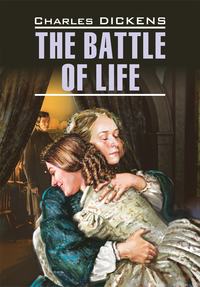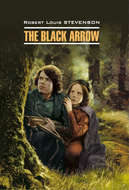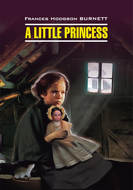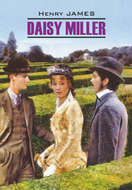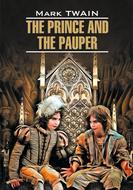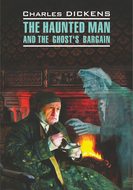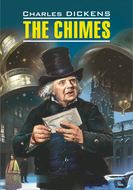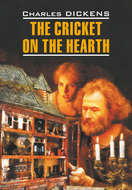Kitabı oxu: «The Battle of Life / Битва жизни. Книга для чтения на английском языке»
Комментарии и словарь Е. Г. Тигонен
© КАРО, 2016
Part the First
Once upon a time, it matters little when, and in stalwart England, it matters little where, a fierce battle was fought. It was fought upon a long summer day when the waving grass was green. Many a wild flower formed by the Almighty Hand to be a perfumed goblet for the dew, felt its enamelled cup filled high with blood that day, and shrinking dropped. Many an insect deriving its delicate colour from harmless leaves and herbs, was stained anew that day by dying men, and marked its frightened way with an unnatural track. The painted butterfly took blood into the air upon the edges of its wings. The stream ran red. The trodden ground became a quagmire, whence, from sullen pools collected in the prints of human feet and horses’ hoofs, the one prevailing hue still lowered and glimmered at the sun.
Heaven keep us from a knowledge of the sights the moon beheld upon that field, when, coming up above the black line of distant rising ground, softened and blurred at the edge by trees, she rose into the sky and looked upon the plain, strewn with upturned faces that had once at mothers’ breasts sought mothers’ eyes, or slumbered happily. Heaven keep us from a knowledge of the secrets whispered afterwards upon the tainted wind that blew across the scene of that day’s work and that night’s death and suffering! Many a lonely moon was bright upon the battle-ground, and many a star kept mournful watch upon it, and many a wind from every quarter of the earth blew over it, before the traces of the fight were worn away.
They lurked and lingered for a long time, but survived in little things; for, Nature, far above the evil passions of men, soon recovered Her serenity, and smiled upon the guilty battle-ground as she had done before, when it was innocent. The larks sang high above it; the swallows skimmed and dipped and flitted to and fro; the shadows of the flying clouds pursued each other swiftly, over grass and corn and turnip field and wood, and over roof and church spire in the nestling town among the trees, away into the bright distance on the borders of the sky and earth, where the red sunsets faded. Crops were sown, and grew up, and were gathered in; the stream that had been crimsoned, turned a watermill; men whistled at the plough; gleaners and haymakers were seen in quiet groups at work; sheep and oxen pastured; boys whooped and called, in fields, to scare away the birds; smoke rose from cottage chimneys; sabbath bells rang peacefully; old people lived and died; the timid creatures of the field, the simple flowers of the bush and garden, grew and withered in their destined terms: and all upon the fierce and bloody battle-ground, where thousands upon thousands had been killed in the great fight. But, there were deep green patches in the growing corn at first, that people looked at awfully. Year after year they re-appeared; and it was known that underneath those fertile spots, heaps of men and horses lay buried, indiscriminately, enriching the ground. The husbandmen who ploughed those places, shrunk from the great worms abounding there; and the sheaves they yielded, were, for many a long year, called the Battle Sheaves, and set apart; and no one ever knew a Battle Sheaf to be among the last load at a Harvest Home. For a long time, every furrow that was turned, revealed some fragments of the fight. For a long time, there were wounded trees upon the battle-ground; and scraps of hacked and broken fence and wall, where deadly struggles had been made; and trampled parts where not a leaf or blade would grow. For a long time, no village girl would dress her hair or bosom with the sweetest flower from that field of death: and after many a year had come and gone, the berries growing there, were still believed to leave too deep a stain upon the hand that plucked them.
The Seasons in their course, however, though they passed as lightly as the summer clouds themselves, obliterated, in the lapse of time1, even these remains of the old conflict; and wore away such legendary traces of it as the neighbouring people carried in their minds, until they dwindled into old wives’ tales, dimly remembered round the winter fire, and waning every year. Where the wild flowers and berries had so long remained upon the stem untouched, gardens arose, and houses were built, and children played at battles on the turf. The wounded trees had long ago made Christmas logs, and blazed and roared away. The deep green patches were no greener now than the memory of those who lay in dust below. The ploughshare still turned up from time to time some rusty bits of metal, but it was hard to say what use they had ever served, and those who found them wondered and disputed. An old dinted corselet, and a helmet, had been hanging in the church so long, that the same weak half blind old man who tried in vain to make them out above the whitewashed arch, had marvelled at them as a baby. If the host slain upon the field, could have been for a moment reanimated in the forms in which they fell, each upon the spot that was the bed of his untimely death, gashed and ghastly soldiers would have stared in, hundreds deep, at household door and window; and would have risen on the hearths of quiet homes; and would have been the garnered store of barns and granaries; and would have started up between the cradled infant and its nurse; and would have floated with the stream, and whirled round on the mill, and crowded the orchard, and burdened the meadow, and piled the rick-yard high with dying men. So altered was the battle ground, where thousands upon thousands had been killed in the great fight.
Nowhere more altered, perhaps, about a hundred years ago, than in one little orchard attached to an old stone house with a honeysuckle porch; where, on a bright autumn morning, there were sounds of music and laughter, and where two girls danced merrily together on the grass, while some half dozen peasant women standing on ladders, gathering the apples from the trees, stopped in their work to look down, and share their enjoyment. It was a pleasant, lively, natural scene; a beautiful day, a retired spot; and the two girls, quite unconstrained and careless, danced in the freedom and gaiety of their hearts.
If there were no such thing as display in the world, my private opinion is, and I hope you agree with me, that we might get on a great deal better than we do, and might be infinitely more agreeable company than we are. It was charming to see how these girls danced. They had no spectators but the apple-pickers on the ladders. They were very glad to please them, but they danced to please themselves (or at least you would have supposed so); and you could no more help admiring, than they could help dancing. How they did dance!
Not like opera dancers. Not at all. And not like Madame Anybody’s finished pupils. Not the least. It was not quadrille dancing, nor minuet dancing, nor even country dance dancing. It was neither in the old style, nor the new style, nor the French style, nor the English style: though it may have been, by accident, a trifle in the Spanish style, which is a free and joyous one, I am told, deriving a delightful air of off-hand inspiration, from the chirping little castanets. As they danced among the orchard trees, and down the groves of stems and back again, and twirled each other lightly round and round, the influence of their airy motion seemed to spread and spread, in the sun lighted scene, like an expanding circle in the water. Their streaming hair and fluttering skirts, the elastic grass beneath their feet, the boughs that rustled in the morning air – the flashing leaves, the speckled shadows on the soft green ground – the balmy wind that swept along the landscape, glad to turn the distant windmill, cheerily – everything between the two girls, and the man and team at plough upon the ridge of land, where they showed against the sky as if they were the last things in the world – seemed dancing too.
At last, the younger of the dancing sisters, out of breath, and laughing gaily, threw herself upon a bench to rest. The other leaned against a tree hard by. The music, a wandering harp and fiddle, left off with a flourish, as if it boasted of its freshness; though the truth is, it had gone at such a pace, and worked itself to such a pitch of competition with the dancing, that it never could have held on, half a minute longer. The apple-pickers on the ladders raised a hum and murmur of applause, and then, in keeping with the sound, bestirred themselves to work again like bees.
The more actively, perhaps, because an elderly gentleman, who was no other than Doctor Jeddler himself – it was Doctor Jeddler’s house and orchard, you should know, and these were Doctor Jeddler’s daughters – came bustling out to see what was the matter, and who the deuce played music on his property, before breakfast. For he was a great philosopher, Doctor Jeddler, and not very musical.
‘Music and dancing TO-DAY!’ said the Doctor, stopping short, and speaking to himself. ‘I thought they dreaded to day. But it’s a world of contradictions. Why, Grace, why, Marion!’ he added, aloud, ‘is the world more mad than usual this morning?’
‘Make some allowance for it2, father, if it be,’ replied his younger daughter, Marion, going close to him, and looking into his face, ‘for it’s somebody’s birthday.’
‘Somebody’s birthday, Puss!’ replied the Doctor. ‘Don’t you know it’s always somebody’s birth day? Did you never hear how many new performers enter on this – ha! ha! ha! – it’s impossible to speak gravely of it – on this preposterous and ridiculous business called Life, every minute?’
‘No, father!’
‘No, not you, of course; you’re a woman – almost,’ said the Doctor. ‘By-the-by,’ and he looked into the pretty face, still close to his, ‘I suppose it’s YOUR birthday.’
‘No! Do you really, father?’ cried his pet daughter, pursing up her red lips to be kissed.
‘There! Take my love with it,’ said the Doctor, imprinting his upon them; ‘and many happy returns of the – the idea! – of the day. The notion of wishing happy returns in such a farce as this,’ said the Doctor to himself, ‘is good! Ha! ha! ha!’
Doctor Jeddler was, as I have said, a great philosopher, and the heart and mystery of his philosophy was, to look upon the world as a gigantic practical joke; as something too absurd to be considered seriously, by any rational man. His system of belief had been, in the beginning, part and parcel3 of the battle-ground on which he lived, as you shall presently understand.
‘Well! But how did you get the music?’ asked the Doctor. ‘Poultry stealers, of course! Where did the minstrels come from?’
‘Alfred sent the music,’ said his daughter Grace, adjusting a few simple flowers in her sister’s hair, with which, in her admiration of that youthful beauty, she had herself adorned it half an hour before, and which the dancing had disarranged.
‘Oh! Alfred sent the music, did he?’ returned the Doctor.
‘Yes. He met it coming out of the town as he was entering early. The men are travelling on foot, and rested there last night; and as it was Marion’s birthday, and he thought it would please her, he sent them on, with a pencilled note4 to me, saying that if I thought so too, they had come to serenade her.’
‘Ay, ay,’ said the Doctor, carelessly, ‘he always takes your opinion.’
‘And my opinion being favourable,’ said Grace, good-humouredly; and pausing for a moment to admire the pretty head she decorated, with her own thrown back; ‘and Marion being in high spirits, and beginning to dance, I joined her. And so we danced to Alfred’s music till we were out of breath. And we thought the music all the gayer for being sent by Alfred. Didn’t we, dear Marion?’
‘Oh, I don’t know, Grace. How you tease me about Alfred.’
‘Tease you by mentioning your lover?’ said her sister.
‘I am sure I don’t much care to have him mentioned,’ said the wilful beauty, stripping the petals from some flowers she held, and scattering them on the ground. ‘I am almost tired of hearing of him; and as to his being my lover —’
‘Hush! Don’t speak lightly of a true heart, which is all your own, Marion,’ cried her sister, ‘even in jest. There is not a truer heart than Alfred’s in the world!’
‘No, no,’ said Marion, raising her eyebrows with a pleasant air of careless consideration, ‘perhaps not. But I don’t know that there’s any great merit in that. I – I don’t want him to be so very true. I never asked him. If he expects that I – But, dear Grace, why need we talk of him at all, just now!’
It was agreeable to see the graceful figures of the blooming sisters, twined together, lingering among the trees, conversing thus, with earnestness opposed to lightness, yet, with love responding tenderly to love. And it was very curious indeed to see the younger sister’s eyes suffused with tears, and something fervently and deeply felt, breaking through the wilfulness of what she said, and striving with it painfully.
The difference between them, in respect of age, could not exceed four years at most; but Grace, as often happens in such cases, when no mother watches over both (the Doctor’s wife was dead), seemed, in her gentle care of her young sister, and in the steadiness of her devotion to her, older than she was; and more removed, in course of nature, from all competition with her, or participation, otherwise than through her sympathy and true affection, in her wayward fancies, than their ages seemed to warrant. Great character of mother, that, even in this shadow and faint reflection of it, purifies the heart, and raises the exalted nature nearer to the angels!
The Doctor’s reflections, as he looked after them, and heard the purport of their discourse, were limited at first to certain merry meditations on the folly of all loves and likings, and the idle imposition practised on themselves by young people, who believed for a moment, that there could be anything serious in such bubbles, and were always undeceived – always!
But, the home-adorning, self-denying qualities of Grace, and her sweet temper, so gentle and retiring, yet including so much constancy and bravery of spirit, seemed all expressed to him in the contrast between her quiet household figure and that of his younger and more beautiful child; and he was sorry for her sake – sorry for them both – that life should be such a very ridiculous business as it was.
The Doctor never dreamed of inquiring whether his children, or either of them, helped in any way to make the scheme a serious one. But then he was a Philosopher.
A kind and generous man by nature, he had stumbled, by chance, over that common Philosopher’s stone (much more easily discovered than the object of the alchemist’s researches), which sometimes trips up kind and generous men, and has the fatal property of turning gold to dross and every precious thing to poor account.
‘Britain!’ cried the Doctor. ‘Britain! Holloa!’
A small man, with an uncommonly sour and discontented face, emerged from the house, and returned to this call the unceremonious acknowledgment of ‘Now then!5’
‘Where’s the breakfast table?’ said the Doctor.
‘In the house,’ returned Britain.
‘Are you going to spread it out here, as you were told last night?’ said the Doctor. ‘Don’t you know that there are gentlemen coming? That there’s business to be done this morning, before the coach comes by? That this is a very particular occasion?’
‘I couldn’t do anything, Dr. Jeddler, till the women had done getting in the apples, could I?’ said Britain, his voice rising with his reasoning, so that it was very loud at last.
‘Well, have they done now?’ replied the Doctor, looking at his watch, and clapping his hands. ‘Come! make haste! where’s Clemency?’
‘Here am I, Mister,’ said a voice from one of the ladders, which a pair of clumsy feet descended briskly. ‘It’s all done now. Clear away, gals. Everything shall be ready for you in half a minute, Mister.’
With that she began to bustle about most vigorously; presenting, as she did so, an appearance sufficiently peculiar to justify a word of introduction.
She was about thirty years old, and had a sufficiently plump and cheerful face, though it was twisted up into an odd expression of tightness that made it comical. But, the extraordinary homeliness of her gait and manner, would have superseded any face in the world. To say that she had two left legs, and somebody else’s arms, and that all four limbs seemed to be out of joint, and to start from perfectly wrong places when they were set in motion, is to offer the mildest outline of the reality. To say that she was perfectly content and satisfied with these arrangements, and regarded them as being no business of hers, and that she took her arms and legs as they came, and allowed them to dispose of themselves just as it happened, is to render faint justice to her equanimity. Her dress was a prodigious pair of self-willed shoes, that never wanted to go where her feet went; blue stockings; a printed gown of many colours, and the most hideous pattern procurable for money; and a white apron. She always wore short sleeves, and always had, by some accident, grazed elbows, in which she took so lively an interest, that she was continually trying to turn them round and get impossible views of them. In general, a little cap placed somewhere on her head; though it was rarely to be met with in the place usually occupied in other subjects, by that article of dress; but, from head to foot she was scrupulously clean, and maintained a kind of dislocated tidiness. Indeed, her laudable anxiety to be tidy and compact in her own conscience as well as in the public eye, gave rise to one of her most startling evolutions, which was to grasp herself sometimes by a sort of wooden handle (part of her clothing, and familiarly called a busk), and wrestle as it were with her garments, until they fell into a symmetrical arrangement.
Such, in outward form and garb, was Clemency Newcome; who was supposed to have unconsciously originated a corruption of her own Christian name, from Clementina (but nobody knew, for the deaf old mother, a very phenomenon of age, whom she had supported almost from a child, was dead, and she had no other relation); who now busied herself in preparing the table, and who stood, at intervals, with her bare red arms crossed, rubbing her grazed elbows with opposite hands, and staring at it very composedly, until she suddenly remembered something else she wanted, and jogged off to fetch it.
‘Here are them two lawyers a-coming, Mister!’ said Clemency, in a tone of no very great good will.
‘Ah!’ cried the Doctor, advancing to the gate to meet them. ‘Good morning, good morning! Grace, my dear! Marion! Here are Messrs. Snitchey and Craggs. Where’s Alfred!’
‘He’ll be back directly, father, no doubt,’ said Grace. ‘He had so much to do this morning in his preparations for departure, that he was up and out by daybreak6. Good morning, gentlemen.’
‘Ladies!’ said Mr. Snitchey, ‘for Self and Craggs,’ who bowed, ‘good morning! Miss,’ to Marion, ‘I kiss your hand.’ Which he did. ‘And I wish you’ – which he might or might not, for he didn’t look, at first sight, like a gentleman troubled with many warm outpourings of soul, in behalf of other people, ‘a hundred happy returns of this auspicious day.’
‘Ha, ha, ha!’ laughed the Doctor thoughtfully, with his hands in his pockets. ‘The great farce in a hundred acts!’
‘You wouldn’t, I am sure,’ said Mr. Snitchey, standing a small professional blue bag against one leg of the table, ‘cut the great farce short for this actress, at all events, Doctor Jeddler.’
‘No,’ returned the Doctor. ‘God forbid! May she live to laugh at it, as long as she CAN laugh, and then say, with the French wit, “The farce is ended; draw the curtain.”’
‘The French wit,’ said Mr. Snitchey, peeping sharply into his blue bag, ‘was wrong, Doctor Jeddler, and your philosophy is altogether wrong, depend upon it, as I have often told you. Nothing serious in life! What do you call law?’
‘A joke,’ replied the Doctor.
‘Did you ever go to law?7’ asked Mr. Snitchey, looking out of the blue bag.
‘Never,’ returned the Doctor.
‘If you ever do,’ said Mr. Snitchey, ‘perhaps you’ll alter that opinion.’
Craggs, who seemed to be represented by Snitchey, and to be conscious of little or no separate existence or personal individuality, offered a remark of his own in this place. It involved the only idea of which he did not stand seized and possessed in equal moieties with Snitchey; but, he had some partners in it among the wise men of the world.
‘It’s made a great deal too easy,’ said Mr. Craggs.
‘Law is?’ asked the Doctor.
‘Yes,’ said Mr. Craggs, ‘everything is. Everything appears to me to be made too easy, now-a-days. It’s the vice of these times. If the world is a joke (I am not prepared to say it isn’t), it ought to be made a very difficult joke to crack8. It ought to be as hard a struggle, sir, as possible. That’s the intention. But, it’s being made far too easy. We are oiling the gates of life. They ought to be rusty. We shall have them beginning to turn, soon, with a smooth sound. Whereas they ought to grate upon their hinges, sir.’
Mr. Craggs seemed positively to grate upon his own hinges, as he delivered this opinion; to which he communicated immense effect – being a cold, hard, dry man, dressed in grey and white, like a flint; with small twinkles in his eyes, as if something struck sparks out of them. The three natural kingdoms, indeed, had each a fanciful representative among this brotherhood of disputants; for Snitchey was like a magpie or raven (only not so sleek), and the Doctor had a streaked face like a winter pippin, with here and there a dimple to express the peckings of the birds, and a very little bit of pigtail behind that stood for the stalk.
As the active figure of a handsome young man, dressed for a journey, and followed by a porter bearing several packages and baskets, entered the orchard at a brisk pace, and with an air of gaiety and hope that accorded well with the morning, these three drew together, like the brothers of the sister Fates, or like the Graces most effectually disguised, or like the three weird prophets on the heath, and greeted him.
‘Happy returns, Alf!’ said the Doctor, lightly.
‘A hundred happy returns of this auspicious day, Mr. Heathfield!’ said Snitchey, bowing low.
‘Returns!’ Craggs murmured in a deep voice, all alone.
‘Why, what a battery!’ exclaimed Alfred, stopping short, ‘and one – two – three – all foreboders of no good, in the great sea before me. I am glad you are not the first I have met this morning: I should have taken it for a bad omen. But, Grace was the first – sweet, pleasant Grace – so I defy you all!’
‘If you please, Mister, I was the first you know,’ said Clemency Newcome. ‘She was walking out here, before sunrise, you remember. I was in the house.’
‘That’s true! Clemency was the first,’ said Alfred. ‘So I defy you with Clemency.’
‘Ha, ha, ha, – for Self and Craggs,’ said Snitchey. ‘What a defiance!’
‘Not so bad a one as it appears, may be,’ said Alfred, shaking hands heartily with the Doctor, and also with Snitchey and Craggs, and then looking round. ‘Where are the – Good Heavens!’
With a start, productive for the moment of a closer partnership between Jonathan Snitchey and Thomas Craggs than the subsisting articles of agreement in that wise contemplated, he hastily betook himself to where the sisters stood together, and – however, I needn’t more particularly explain his manner of saluting Marion first, and Grace afterwards, than by hinting that Mr. Craggs may possibly have considered it ‘too easy.’
Perhaps to change the subject, Dr. Jeddler made a hasty move towards the breakfast, and they all sat down at table. Grace presided; but so discreetly stationed herself, as to cut off her sister and Alfred from the rest of the company. Snitchey and Craggs sat at opposite corners, with the blue bag between them for safety; the Doctor took his usual position, opposite to Grace. Clemency hovered galvanically about the table, as waitress; and the melancholy Britain, at another and a smaller board, acted as Grand Carver of a round of beef and a ham.
‘Meat?’ said Britain, approaching Mr. Snitchey, with the carving knife and fork in his hands, and throwing the question at him like a missile.
‘Certainly,’ returned the lawyer. ‘Do YOU want any?’ to Craggs.
‘Lean and well done,’ replied that gentleman.
Having executed these orders, and moderately supplied the Doctor (he seemed to know that nobody else wanted anything to eat), he lingered as near the Firm as he decently could, watching with an austere eye their disposition of the viands, and but once relaxing the severe expression of his face. This was on the occasion of Mr. Craggs, whose teeth were not of the best, partially choking, when he cried out with great animation, ‘I thought he was gone!’
‘Now, Alfred,’ said the Doctor, ‘for a word or two of business, while we are yet at breakfast.’
‘While we are yet at breakfast,’ said Snitchey and Craggs, who seemed to have no present idea of leaving off.
Although Alfred had not been breakfasting, and seemed to have quite enough business on his hands as it was, he respectfully answered:
‘If you please, sir.’
‘If anything could be serious,’ the Doctor began, ‘in such a – ‘
‘Farce as this, sir,’ hinted Alfred.
‘In such a farce as this,’ observed the Doctor, ‘it might be this recurrence, on the eve of separation, of a double birthday, which is connected with many associations pleasant to us four, and with the recollection of a long and amicable intercourse. That’s not to the purpose.’
‘Ah! yes, yes, Dr. Jeddler,’ said the young man. ‘It is to the purpose. Much to the purpose, as my heart bears witness this morning; and as yours does too, I know, if you would let it speak. I leave your house to-day; I cease to be your ward to-day; we part with tender relations stretching far behind us, that never can be exactly renewed, and with others dawning – yet before us,’ he looked down at Marion beside him, ‘fraught with such considerations as I must not trust myself to speak of now. Come, come!’ he added, rallying his spirits and the Doctor at once, ‘there’s a serious grain in this large foolish dust-heap, Doctor. Let us allow to-day, that there is One.’
‘To-day!’ cried the Doctor. ‘Hear him! Ha, ha, ha! Of all days in the foolish year. Why, on this day, the great battle was fought on this ground. On this ground where we now sit, where I saw my two girls dance this morning, where the fruit has just been gathered for our eating from these trees, the roots of which are struck in Men, not earth, – so many lives were lost, that within my recollection, generations afterwards, a churchyard full of bones, and dust of bones, and chips of cloven skulls, has been dug up from underneath our feet here. Yet not a hundred people in that battle knew for what they fought, or why; not a hundred of the inconsiderate rejoicers in the victory, why they rejoiced. Not half a hundred people were the better for the gain or loss. Not half a dozen men agree to this hour on the cause or merits; and nobody, in short, ever knew anything distinct about it, but the mourners of the slain. Serious, too!’ said the Doctor, laughing. ‘Such a system!’
‘But, all this seems to me,’ said Alfred, ‘to be very serious.’
‘Serious!’ cried the Doctor. ‘If you allowed such things to be serious, you must go mad, or die, or climb up to the top of a mountain, and turn hermit.’
‘Besides – so long ago,’ said Alfred.
‘Long ago!’ returned the Doctor. ‘Do you know what the world has been doing, ever since? Do you know what else it has been doing? I don’t!’
‘It has gone to law a little,’ observed Mr. Snitchey, stirring his tea.
‘Although the way out has been always made too easy,’ said his partner.
‘And you’ll excuse my saying, Doctor,’ pursued Mr. Snitchey, ‘having been already put a thousand times in possession of my opinion, in the course of our discussions, that, in its having gone to law, and in its legal system altogether, I do observe a serious side – now, really, a something tangible, and with a purpose and intention in it —’
Clemency Newcome made an angular tumble against the table, occasioning a sounding clatter among the cups and saucers.
‘Heyday! what’s the matter there?’ exclaimed the Doctor.
‘It’s this evil-inclined blue bag,’ said Clemency, ‘always tripping up somebody!’
‘With a purpose and intention in it, I was saying,’ resumed Snitchey, ‘that commands respect. Life a farce, Dr. Jeddler? With law in it?’
The Doctor laughed, and looked at Alfred.
‘Granted, if you please, that war is foolish,’ said Snitchey. ‘There we agree. For example. Here’s a smiling country,’ pointing it out with his fork, ‘once overrun by soldiers – trespassers every man of ’em – and laid waste by fire and sword. He, he, he! The idea of any man exposing himself, voluntarily, to fire and sword! Stupid, wasteful, positively ridiculous; you laugh at your fellow creatures, you know, when you think of it! But take this smiling country as it stands9. Think of the laws appertaining to real property; to the bequest and devise of real property; to the mortgage and redemption of real property; to leasehold, freehold, and copyhold estate; think,’ said Mr. Snitchey, with such great emotion that he actually smacked his lips, ‘of the complicated laws relating to title and proof of title, with all the contradictory precedents and numerous acts of parliament connected with them; think of the infinite number of ingenious and interminable chancery suits, to which this pleasant prospect may give rise; and acknowledge, Dr. Jeddler, that there is a green spot in the scheme about us! I believe,’ said Mr. Snitchey, looking at his partner, ‘that I speak for Self and Craggs?’
in the lapse of time – (уст.) с течением времени
[Закрыть]
Make some allowance for it – (разг.) Учтите; примите во внимание
[Закрыть]
part and parcel – (разг.) неотъемлемая часть
[Закрыть]
with a pencilled note – (разг.) с запиской
[Закрыть]
Now then! – (разг.) Ну!
[Закрыть]
he was up and out by daybreak – (разг.) он поднялся и ушел с рассветом
[Закрыть]
Did you ever go to law? – (разг.) Вы когда-нибудь подавали в суд?
[Закрыть]
a very difficult joke to crack – (разг.) трудная задача
[Закрыть]
as it stands – (разг.) при создавшемся положении; при теперешнем положении вещей
[Закрыть]
Pulsuz fraqment bitdi.
